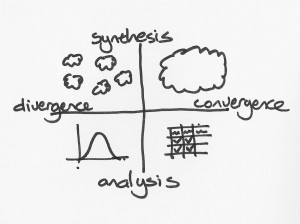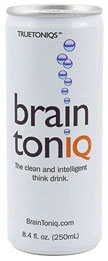Many older adults worry about memory loss. This is a serious issue especially if it leads to dementia and the inability to do the activities of daily living.
But just as serious, and more so in many ways, is the dramatic loss of divergent thinking skills in young children.
One long-term study found that in a group of 1600 children those that ranked tops in divergent thinking dropped dramatically with age. Specifically, those achieving a top score for divergent thinking went from 98% in kindergarten to 32% five years later to just 10% when they reached early teens. Divergent thinking is a natural talent and is rapidly educated and socialized away.
 Divergent thinking is the capacity to see multiple options, alternatives or possibilities. The goal is not to find a solution but instead find an enormous range of potential and therefore very different solutions. For example, how many interesting uses can you find for a rubber band? On average people might find 10-20, genius level performance would generate in excess of 150. The trick to generating many more options is to begin to relax assumptions about what a rubber band is. What if it was a mile long? Of course, some would claim that is cheating, as we have all been taught to do. Just as there is one right answer so why worry about so many?
Divergent thinking is the capacity to see multiple options, alternatives or possibilities. The goal is not to find a solution but instead find an enormous range of potential and therefore very different solutions. For example, how many interesting uses can you find for a rubber band? On average people might find 10-20, genius level performance would generate in excess of 150. The trick to generating many more options is to begin to relax assumptions about what a rubber band is. What if it was a mile long? Of course, some would claim that is cheating, as we have all been taught to do. Just as there is one right answer so why worry about so many?
The question is how can we reclaim our genius level of performance in divergent thinking? How can we then channel it into creative expression and break-through problem solving?
Mind mapping, journaling and traditional brainstorming are techniques that are typically offered to those looking to build divergent thinking skills.
Start simple with brainstorming by yourself but apply it to a practical problem that means something to your right now.
Here is what you do. Let’s say you are buying a new computer. Use divergent thinking to decide what to do with the old one. Set a time limit (say 20 minutes at most), and list as many ideas as you can. Best to write them down. Go for the largest number, don’t worry if they are good/bad, look at how you can combine ideas and allow for the weird and strange. Have fun with it. Open up your mental jets.
 With continued practice your mind will get use to this mode of thinking again and you will start to reclaim your divergent thinking talent. Consider using mind mapping or some other way of seeing how your ideas related to each other visually. Include others. Let alternatives bubble up all day or all week and capture them in a journal as you go. Soon your thinking will diverge far and fast when you want it to. The payoff? Good ideas that you would have normally never even considered.
With continued practice your mind will get use to this mode of thinking again and you will start to reclaim your divergent thinking talent. Consider using mind mapping or some other way of seeing how your ideas related to each other visually. Include others. Let alternatives bubble up all day or all week and capture them in a journal as you go. Soon your thinking will diverge far and fast when you want it to. The payoff? Good ideas that you would have normally never even considered.
Interested to hear form readers that practice divergent thinking. What techniques do you use?
 Exciting new research suggests that a mother’s brain undergoes significant growth (actually gets larger) in several areas just after birth. Additional brain volume in turn leads to improved cognitive performance. Specifically, hormonal changes seem to trigger improvements in maternal motivation, emotional processing, sensory integration and reasoning and judgment.
Exciting new research suggests that a mother’s brain undergoes significant growth (actually gets larger) in several areas just after birth. Additional brain volume in turn leads to improved cognitive performance. Specifically, hormonal changes seem to trigger improvements in maternal motivation, emotional processing, sensory integration and reasoning and judgment.
The research is reported in the journal Behavioral Neuroscience and summarized nicely in Science Daily.
“In particular, the mothers who most enthusiastically rated their babies as special, beautiful, ideal, perfect and so on were significantly more likely to develop bigger mid-brains than the less awestruck mothers in key areas linked to maternal motivation, rewards and the regulation of emotions.”
Although motherhood is not a strategy for improving brain function and cognitive performance it does seem to have that effect. Especially for those that truly cherish what they have. This is a fry cry from some commonly held beliefs that motherhood can “turn your brain into mush”. It may seem that way with the all additional responsibilities, learning that must be done and the new things to remember but that is how growth normally feels.
Just as the aging mind ripens in many ways with time, taking on the responsibilities of motherhood appears to push the brain to a whole new level of performance.
 We all know exercise is a good for the brain. But what types should I do, how much and what benefits can I expect? We try and answer these questions in the Next Brain Blog by looking at the latest scientific studies.
We all know exercise is a good for the brain. But what types should I do, how much and what benefits can I expect? We try and answer these questions in the Next Brain Blog by looking at the latest scientific studies.
Take for example the study published by Kirk I. Erickson in the October 13th issue of Neurology Online and reported by Web MD as Walking May Ward Off Memory Loss. The study found walking 72 blocks per week or approximately 6-9 miles early in life can actually increase the volume of grey matter in the brain and avoid shrinkage-related memory problems. Furthermore,
“Researchers say those who walked the most cut their risk of developing memory loss in half.”
This effective was found in dementia free older adults and measured over a period of nine years.
 According to research recently reported in the Wall Street Journal, Building a More Resilient Brain, you can improve thinking and brain health by learning a new language. There is some evidence that learning a second language can improve your cognitive control (stop paying attention to one thing and focus on another) and may stave off the effects of dementia for several years by building up cognitive reserve. Unfortunately, it is not know when in life it is best to learn the language and if you need to use it daily to get these benefits.
According to research recently reported in the Wall Street Journal, Building a More Resilient Brain, you can improve thinking and brain health by learning a new language. There is some evidence that learning a second language can improve your cognitive control (stop paying attention to one thing and focus on another) and may stave off the effects of dementia for several years by building up cognitive reserve. Unfortunately, it is not know when in life it is best to learn the language and if you need to use it daily to get these benefits.
Learning a second language is a major undertaking but does promise to improve brain function and cognitive performance. Very interested to hear from readers that have learned a second language and believe it has had brain boosting effects.
 In neurofeedback training you learn to regulate your brainwaves. As the neurons in your brain fire they produce an electrical signature across your scalp call an Electroencephalograph or EEG. The EEG is detected using sensors on your head and is feed into a device that turns it into a signal such as a beep, movement of the cursor on a computer screen, a change in a video game or even the motion of a remote control toy. The idea is that the signal acts as feedback for learning to get your brain into a certain state such as relaxation, creative flow, higher processing speed, greater focus and so on.
In neurofeedback training you learn to regulate your brainwaves. As the neurons in your brain fire they produce an electrical signature across your scalp call an Electroencephalograph or EEG. The EEG is detected using sensors on your head and is feed into a device that turns it into a signal such as a beep, movement of the cursor on a computer screen, a change in a video game or even the motion of a remote control toy. The idea is that the signal acts as feedback for learning to get your brain into a certain state such as relaxation, creative flow, higher processing speed, greater focus and so on.
Neurofeedback is a powerful tool for improving your brain function and cognitive performance and will be covered frequently on the Next Brain Blog. Getting access to clinical grade neurofeedback training can be hard and costly. That may be changing with Neurotopia’s recent announcement of a remote version of their NeuroStation:
“The NeuroStation™ REMOTE is the first technology designed specifically for widespread adoption of neurofeedback. Neurotopia represents a paradigm shift by bringing neurofeedback into the consumer market through healthcare providers, academic centers, and sports performance facilities.”
Neurotopia is well-known for using the most advanced protocols and equipment to achieve real results with neurofeedback. They have specific protocols for achieving peak performance. It includes zone, reaction time, balance, recovery and sleep techniques and is applicable to sports, business and all walks of life.
Interested to hear from readers that have experience with Neurotopia’s approach or other clinician delivered neurofeedback training for peak cognitive performance.
 I get email from readers asking about how to run brainstorming sessions. These are group meetings that are designed to come up with creative new ideas on hard problems. Many times such meeting can be a disappointment. The questions is – what specific practices can we use to improve group cognitive performance during brainstorming? Just the stuff we want to discuss on the Next Brain Blog.
I get email from readers asking about how to run brainstorming sessions. These are group meetings that are designed to come up with creative new ideas on hard problems. Many times such meeting can be a disappointment. The questions is – what specific practices can we use to improve group cognitive performance during brainstorming? Just the stuff we want to discuss on the Next Brain Blog.
North Carolina University just released a comprehensive study that Finds Brainstorming Rules Can Lead to Real-World Success in Business Settings.
“The study found that there are 21 specific best practices that contributed to successful brainstorming efforts, and that the benefits of high quality brainstorming could be attained when at least 10 to 11 of those practices are put into place – such as the inclusion of subject-matter specialists and an openness to input from all team members.”
This is one of the few empirical studies I have found that shows the quality of brainstorming can impact group decision-making. You can find the details in a free draft version of the paper. They quote a lot of interesting research some of which flies in the face of normal practice. For example:
“More importantly, contemporary experimental research by Lynch et al. 2009 and Hunton and Gold 2010 find that the brainstorming methods that are predominant in practice e.g., face-to-face communication and open brainstorming are less effective than alternative methods e.g., electronic communication and round robin brainstorming.”
Interested to hear from readers that use specific techniques to improve the cognitive performance of brainstorming.
 There are a growing number of drinks – flavored, caffenitated, organic and high-energy that have been specially formulated to improve your brain function and cognitive performance.
There are a growing number of drinks – flavored, caffenitated, organic and high-energy that have been specially formulated to improve your brain function and cognitive performance.
Take for example, the brand new product Nawgan. It was developed by a brain scientist, comes in berry flavor (caffeintate or not) and claims:
“The Nawgan formula supports memory and thinking skills in four ways. First, the lycopene in the beverage provides anti-inflammatory protection. Second, the natural vitamin E provides powerful anti-oxidant protection. Third, the alpha-glyceryl phosphoryl choline and citicoline (cognizin®) helps to increase acetylcholine levels in the brain (acetylcholine is critical for memory and thinking skills). Fourth, the citicoline also helps to provide structural support to brain cells, (phospholipids).”
You can buy it online for the price of an energy drink but must buy a case.
For a different approach, consider Brain Toniq that bills itself as botanical-based “think drink” designed to improve mental focus. An antidote to brain fog.


Another alternative is Focus Up, a prepackaged powder you can add to a bottle of water.

Interested to hear from readers that use drinks specially formulated to boost brain function and cognitive performance.
 Posit Science, a leading provider of brain training software, has a interesting post on Nuts for Brain Health. They claim:
Posit Science, a leading provider of brain training software, has a interesting post on Nuts for Brain Health. They claim:
- Walnuts, almonds and hazelnuts have scientific studies that support claims for brain boosting effects
- Peanuts have preliminary evidence that support their role in brain health
- Other nuts that are often mentioned for brain health including pecans, chestnuts and cashews lack published scientific studies.
A useful summary for those considering including nuts in a Next Brain diet. Interested to hear from readers that eat nuts to improve brain function and cognitive performance.
 We all have an inner voice. In fact, we talk to ourselves silently throughout the day. Our inner voice is a big part of our mental life but what role does it play in improving brain function and cognitive performance?
We all have an inner voice. In fact, we talk to ourselves silently throughout the day. Our inner voice is a big part of our mental life but what role does it play in improving brain function and cognitive performance?
Found an interesting new study from the University of Toronto that suggest Inner Voice Plays a Role in Self Control. Here is what they claim:
“Through a series of tests, we found that people acted more impulsively when they couldn’t use their inner voice or talk themselves through the tasks,” says Inzlicht. “Without being able to verbalize messages to themselves, they were not able to exercise the same amount of self control as when they could talk themselves through the process.”
What kind of self talk works best? There has been a lot written on avoiding negative self talk especially if it involves cognitive distortions (e.g. I NEVER do anything right) as well as the power of positive self talk. The interesting thing about the Toronto study is that it did not control for the tone of your inner voice. Common sense suggests keeping neutral or positive and task focused is best.
Like to hear from readers that use inner voice to improve cognitive performance. What do you say and why do you think it works?
On the Next Brain blog we explore specific techniques for improving brain function and cognitive performance. We report on techniques from any field where excellence in thinking, learning, perception, memory, creativity, decision-making and other mental functions are known to take place. For example, consider the field of philosophy. Philosophers are known for their ability to think deeply and clearly about the most complex topics. What can we learn from them to enhance our cognitive performance?

One technique that you can pick up fairly quickly and use nearly every day is call the Toulmin Method. This is a method for analyzing text or verbal statements and abstracting any argument that is being made. Making the claim, reasons and justification for an argument clear is a key step in being able to think analytically about a topic rather than just going with our gut instinct.
Colorado State University has developed an excellent guide to The Toulmin Method. In short and simple language it breaks down the parts to an argument, explains how to see them in everyday circumstances and even provides a worksheet to apply the method.
It should take no more than 45 minutes to work through the site including the student example. You can pick a newspaper story, blog post, memo from work or passage from a book you are reading and try and apply it. Keep using it and you will see how the depth and intellectual clarity you have around key issues and arguments improves. You might even find yourself changing your mind on important matters!
Interested to hear from readers that use the Toulmin Method or any other technique for making arguments explicit and analyzing them.
 Divergent thinking is the capacity to see multiple options, alternatives or possibilities. The goal is not to find a solution but instead find an enormous range of potential and therefore very different solutions. For example, how many interesting uses can you find for a rubber band? On average people might find 10-20, genius level performance would generate in excess of 150. The trick to generating many more options is to begin to relax assumptions about what a rubber band is. What if it was a mile long? Of course, some would claim that is cheating, as we have all been taught to do. Just as there is one right answer so why worry about so many?
Divergent thinking is the capacity to see multiple options, alternatives or possibilities. The goal is not to find a solution but instead find an enormous range of potential and therefore very different solutions. For example, how many interesting uses can you find for a rubber band? On average people might find 10-20, genius level performance would generate in excess of 150. The trick to generating many more options is to begin to relax assumptions about what a rubber band is. What if it was a mile long? Of course, some would claim that is cheating, as we have all been taught to do. Just as there is one right answer so why worry about so many? With continued practice your mind will get use to this mode of thinking again and you will start to reclaim your divergent thinking talent. Consider using mind mapping or some other way of seeing how your ideas related to each other visually. Include others. Let alternatives bubble up all day or all week and capture them in a journal as you go. Soon your thinking will diverge far and fast when you want it to. The payoff? Good ideas that you would have normally never even considered.
With continued practice your mind will get use to this mode of thinking again and you will start to reclaim your divergent thinking talent. Consider using mind mapping or some other way of seeing how your ideas related to each other visually. Include others. Let alternatives bubble up all day or all week and capture them in a journal as you go. Soon your thinking will diverge far and fast when you want it to. The payoff? Good ideas that you would have normally never even considered.











